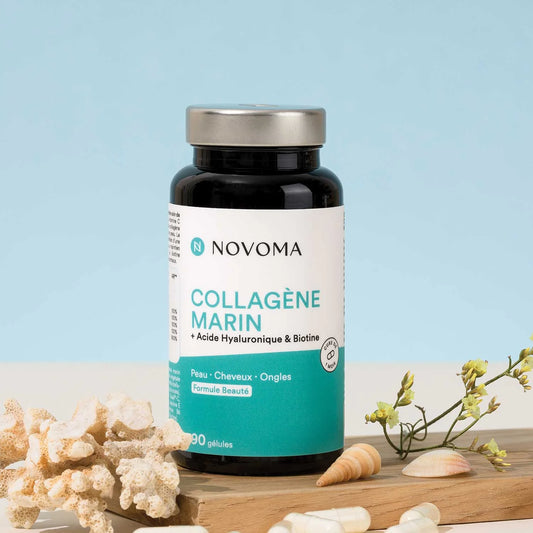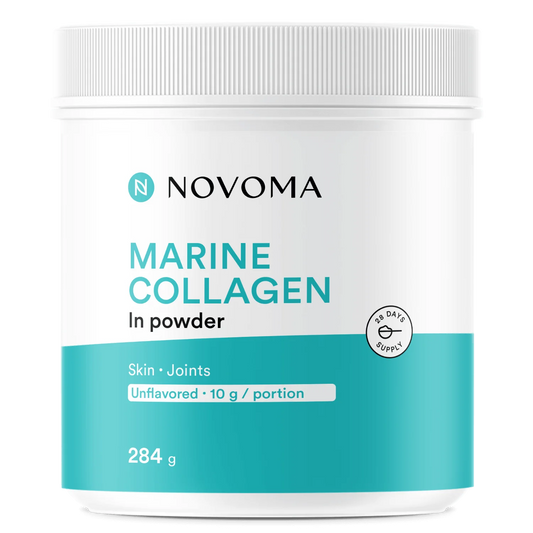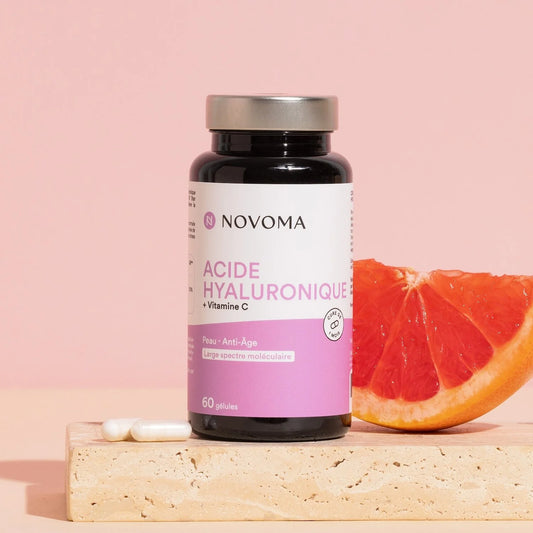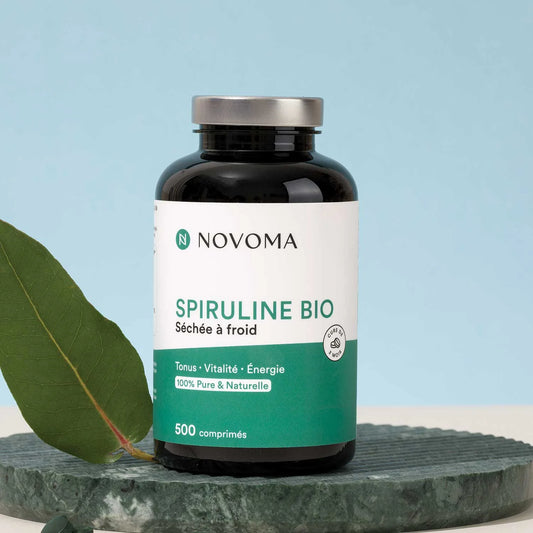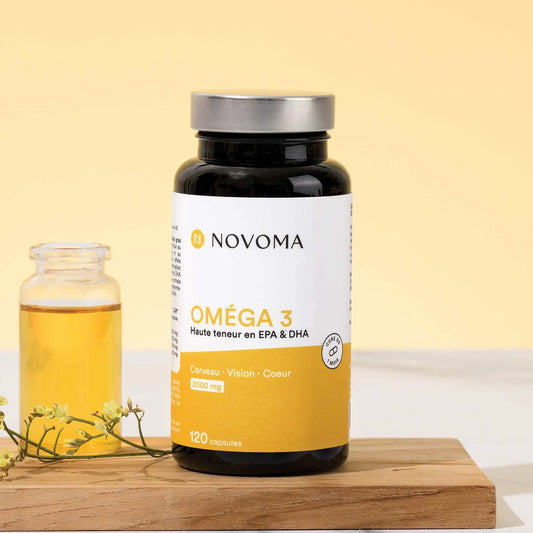
What is marine collagen used for and why start at age 25?
Summary
You may have heard that inner voice whispering to you, “You should start taking care of your skin even if it looks smooth and youthful.” And they’re right! Even though at 25 or 30, we often feel invincible when it comes to youthful skin, this is precisely the time when the body slowly begins to produce less collagen. This is where marine collagen comes in: discreetly, but surely.
👉 In this article, we explain what marine collagen is used for , why it is relevant to take supplements from the age of 25, and how to choose it well to avoid buying ineffective magic powder!
Collagen: a key protein for the skin
It's all the rage in cosmetics, and yet, collagen is above all an essential structural protein of the skin .
Definition: Collagen, the skin's miracle protein
Collagen acts like your body's memory foam mattress: its role is to support, structure, and cushion. Naturally present in all connective tissues (skin, cartilage, tendons, bones, etc.), it represents approximately 30% of the body's total proteins .
It's this protein that gives your skin its firmness, elasticity, and ability to heal. There are several types of collagen, but types I, II, and III are the most common.
Type I collagen peptides: the structural pillars of the dermis
Of the many types of collagen found in the human body (there are at least 28!), type I is by far the most abundant – and the most important for the skin. It alone accounts for over 80% of the total collagen in the dermis . It acts as a strong support for the skin, without which the skin loses firmness and elasticity, and becomes more vulnerable to external aggressions.
Marine collagen primarily targets type I collagen. Sourced from fish skin and bones, it's particularly rich in highly bioavailable type I collagen peptides. In short: easily absorbed by the body and directly useful where needed.
Cohesion, elasticity, resistance: the benefits of collagen
Collagen isn't just a special protein for skin beauty. It's a true cellular architect that acts on several levels:
👉 Ensure cohesion between the different layers of the skin (epidermis, dermis, hypodermis) and allow the tissues to remain welded and resistant to shocks and daily stresses;
👉 Support skin elasticity . Its triple helix structure helps the skin regain its original shape after stretching (smiling, frowning, yawning... in short, life!). It is also collagen that prevents the formation of the famous sagging wrinkles, those small marks that appear on the oval of the face or the neck;
👉 Strengthen the skin's resistance. It protects it from mechanical aggressions (friction, pressure) , but also from chemical or environmental aggressions;
👉 Improve tissue regeneration and hydration , ensuring better water retention in the dermis. Less tightness, more comfort, and a natural glow that rivals Instagram filters.
We recommend you
Marine Collagen Powder
Hydrolyzed Marine Collagen Powder Type I & III.
- ✅ Fine powder easy to dissolve
- ✅ Available in 3 flavors
- ✅ 1 month treatment
- ✅ Made in France 🇫🇷
What is the purpose of collagen on fibroblasts?
More than just a beauty protein, collagen acts in direct interaction with fibroblasts , the cells at the heart of the proper functioning of the dermis. Explanations.
Fibroblasts: the architects of the dermis
Fibroblasts are cells located in the dermis (the middle layer of the skin). Their function? To produce and maintain the major components of the extracellular matrix, including collagen, elastin, and hyaluronic acid . In other words, they are the cells that provide the structure, firmness, and elasticity of our skin.
They organize and renew the "cement" that supports the skin. But with age, their activity slows, as does their ability to produce collagen fibers. The result? Skin that loses density and elasticity, and begins to show its age. Fortunately, it's reversible!
Marine collagen: real fuel for fibroblasts
One of the strengths of marine collagen is its ability to naturally stimulate fibroblasts. Thanks to its high bioavailability, it is easily absorbed in the intestine and transported to the dermis, where it acts as a biological signal: it "informs" the fibroblasts that it's time to roll up their sleeves.
✅ This process is called positive feedback. Collagen peptides in the bloodstream are perceived as a sign of dermal matrix breakdown, prompting fibroblasts to produce more collagen to repair what they believe to be a loss. The skin is more toned and better hydrated.
Collagen and skin: tightening effect, restored firmness and prolonged youthfulness
When collagen is present (and well assimilated) , it acts on several fronts: it gives the skin its "plump" effect, it smooths fine lines and slows down the development of deeper wrinkles. By providing the right amino acids (glycine, proline, hydroxyproline) , taking marine collagen helps nourish the fibroblasts.
👉 Thanks to the action of the revived fibroblasts, the extracellular matrix reorganizes itself: elastin supports flexibility, hyaluronic acid captures hydration, and collagen solidifies the whole. It is this synergy that gives this natural tightening effect that no cream can completely reproduce. No, it's not magic, just well-oiled biology. 😏

Why does collagen production decrease from the age of 25?
Even if wrinkles haven't yet appeared at age 25, our bodies are already starting to slow down. A biological detail with major consequences for the youthfulness of our skin!
Natural decline: a gentle, but irreversible loss every year
It's the kind of figure that often goes unnoticed, but from the age of 25, natural collagen production decreases by around 1% per year . A slow, but constant and irreversible decline if it is not sustained.
This means that at 35, our dermis is already about 10% less rich in collagen than at 25. Less collagen means less structural support for the skin, therefore less toned skin, and more prone to the first visible signs of aging. And just because we can't see them yet doesn't mean they aren't preparing behind the scenes... 🥲
Other factors in collagen decline
As if the passing of time were not enough, our modern lifestyle and certain habits add another layer to this natural loss.
👉 Sun exposure, and particularly UV rays, destroys collagen fibers and stimulates the activity of enzymes that degrade them (called metalloproteinases);
👉 Oxidative stress, caused by free radicals (e.g. pollution, chronic stress or an unbalanced diet), accelerates the degradation of skin cells;
👉 Tobacco is a declared enemy of collagen: it reduces tissue oxygenation and inhibits collagen synthesis;
👉 A sedentary lifestyle limits the proper circulation of nutrients to the skin;
👉 A diet poor in antioxidants , zinc or vitamin C (essential cofactors for collagen synthesis) further impoverishes the quality of the skin.
The result: a loss of skin firmness , a loss of elasticity and the appearance of the first marks on the skin. Dehydration or expression lines slowly appear, followed closely by a more general sagging of the facial contours. Fortunately, a targeted treatment of marine collagen can make the difference and prolong this youthful capital that we thought we had acquired.
We recommend you
Marine Collagen
Beauty formula based on marine collagen and hyaluronic acid, enriched with vitamins A, B, C, E and Zinc.
- ✅ 3-in-1 action
- ✅ 1000 mg of patented marine collagen
- ✅ 90 easy-to-swallow capsules
- ✅ Made in France 🇫🇷
Hydrolyzed marine collagen supplementation: a preventive and long-term anti-aging strategy
You might think that a good serum is enough to preserve our skin. But it's by acting from the inside out and upstream that the effects are seen. A hydrolyzed marine collagen supplement offers a natural solution to support youthful skin.
Hydrolyzed Marine Collagen: The Best Collagen for Optimal Absorption
"Hydrolyzed" marine collagen refers to its extraction process . It is obtained by fragmentation into low molecular weight peptides, and displays high assimilation by the body. These peptides pass the intestinal barrier and reach the dermis where the fibroblasts are located. They then act as real signals and stimulate the cells responsible for the natural production of collagen.
👉This high bioavailability is what sets it apart from native marine collagen . A clinical study published in the Journal of Cosmetic Dermatology (2021) showed that daily ingestion of hydrolyzed collagen for 90 days will be effective in slowing skin aging, as it reduces wrinkles and improves skin elasticity and hydration. Add to this the fact that collagen hydrolyzate stimulates the synthesis of other molecules essential for youthful skin and nails, such as elastin and hyaluronic acid. Could this be the best marine collagen ? Most definitely!
Naturally compensate for the drop in collagen production
Supplementation can help counteract this gradual loss and maintain a denser, more resilient dermal structure. It's not about stopping time (we'll leave that to science fiction), but about slowing down its impact. A well-thought-out and well-dosed marine collagen treatment can be a real preventative measure. We maintain what we want to make last! 🫡
The effects of type I marine collagen: visible results in just a few weeks
Several clinical studies have observed concrete effects after a few weeks of taking it: more supple, more hydrated skin, significant reduction in wrinkles, improvement in elasticity and complexion.
💡Tip: To boost the effectiveness of collagen, choose a supplement that also contains vitamin C. This vitamin is essential for the body's collagen synthesis, a winning duo for optimized results.

When and how to start a collagen treatment?
The right time to take care of your skin is before it asks for it! Here's when and how to start a collagen treatment .
From 25-30 years old as a preventative measure: slowing down hair loss before it starts
This is the perfect time to take action before the visible signs of aging set in. Taking a marine collagen treatment at this age helps the skin maintain its natural elasticity and acts as a preventative measure, especially if your lifestyle (smoking, urban pollution, etc.) is a stress factor for your body.
After 40: to support the skin's natural regeneration
After the age of forty, natural collagen production slows down more markedly . This is where supplementation can be a real support. An external intake of hydrolyzed marine collagen peptides helps support the natural regeneration mechanisms of the dermis and would significantly reduce pigment spots linked to skin aging, according to researchers.✌️
Tips that make the difference for concrete results on the skin
A 2- to 3-month course of treatment is generally sufficient to begin to see the first benefits. This duration allows the body to properly assimilate the peptides and gradually restart endogenous synthesis.
Our practical advice:
✔️Take your collagen daily, preferably in the morning on an empty stomach or outside of meals for better absorption;
✔️Combine it with vitamin C to boost synthesis and vitamin D3, which helps stimulate collagen production and protect the body;
✔️Repeat the treatment 2 to 3 times a year: at seasonal changes, during periods of stress, sustained physical activity or fatigue, when the skin and connective tissues need reinforced support.
We recommend you
Marine Collagen Powder
Hydrolyzed Marine Collagen Powder Type I & III.
- ✅ Fine powder easy to dissolve
- ✅ Available in 3 flavors
- ✅ 1 month treatment
- ✅ Made in France 🇫🇷
How to optimize the effects of marine collagen?
Combined with good practices, a marine collagen supplement can really make a difference. Here's how to get the most out of its benefits.👇
A diet rich in antioxidants
Antioxidants are collagen's best friend. They neutralize free radicals that accelerate the breakdown of collagen fibers in the skin. A colorful plate = plumper skin!
👉 Focus on red fruits (blueberries, strawberries, raspberries) , real antioxidant bombs, green vegetables (spinach, broccoli) rich in vitamin C and E, and omega-3 (oily fish, flax seeds, walnuts) which promote skin elasticity.
And of course, moisturize. Dehydrated skin is skin that wrinkles more quickly!
A well-formulated complex: a clean composition and the presence of vitamin C
Not all collagen supplements are created equal. What you want is:
A hydrolyzed marine collagen for optimal assimilation;
The association with vitamin C essential for the synthesis of collagen;
The total absence of additives, superfluous ingredients, colorings and the mention of serious quality labels (organic, FSC sustainable fishing) ;
An appropriate dosage: a dose of between 5 and 10 g per day of collagen peptides is considered effective by clinical studies.
Novoma Hydrolyzed Marine Collagen ticks all the boxes, backed by strong proven efficacy data.✌️

✅ Marine Collagen in capsules : combined with hyaluronic acid, vitamin C, vitamin E, zinc bisglycinate, biotin and vitamin B6, active ingredients designed to maximize its effects on the skin.
✅ Marine Collagen Powder : Naticol® Type I and III hydrolyzed, sourced from sustainable fisheries, enriched with Vitamin C, no artificial flavors. Available in natural, red fruit, caramel, or mango flavors (the team's favorite).
Provide a healthy environment for your skin
Consuming collagen can improve the condition of the skin, yes, provided you adopt good daily habits and limit:
Excessive exposure to the sun without protection;
Tobacco which significantly reduces natural collagen production;
Chronic stress, which promotes skin reactivity and therefore aging.
-
Sedentary lifestyle, which impacts circulation and therefore the nutrition of the skin.
Marine collagen isn't just for skin that's already damaged by age. It provides valuable structural support for our bodies and skin from the age of 25. By starting as a preventative measure and combining it with a balanced lifestyle, you're giving your skin the best conditions to stay firm, supple, and radiant for longer!









